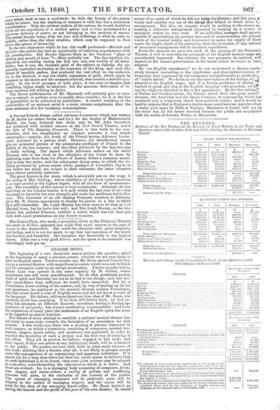ENGLISH OPERA.
The beginning of a new theatrical season revives the question, asked at the beginning of many a previous season, whether we are ever again to have an English opera. Twelve months ago, Mr. Bunn opened Covent Gar- den as a musical theatre, with magnificent promises which were not fulfilled, and his enterprise came to an abrupt termination. Twelve months before, Drury Lane was opened in the same capacity by M. Jullien, whose Programme was still more grandiloquent. To do that gentleman justice, want of spirit and liberality are not to be laid to his charge; and, had pro- fuse expenditure been sufficient, he would have succeeded. But he, a Frenchman, knew nothing of the matter; and, by way of making up for his own ignorance, he employed as his musical director another Frenchman, who had never heard a note of English music and did not know a word of the language. His failure, still more disastrous than that of Mr. Bunn, was certainly much less surprising. If we look still further back, we find no- thing but attempts, at different theatres, sometimes having a fleeting ap- pearance of prosperity, but always terminating unsuccessfully; and from the experience of many years the attainment of an English opera has come to be regarded as almost hopeless.
The failure of every attempt to establish a national musical theatre has led lately to some steps towards the formation of an association for that Purpose. A few weeks ago, there was a meeting of persons interested in such matters; at which a committee, consisting of composers, musical dra- matists, singers, music-sellers, and amateurs, was appointed, iu order to consider the feasibility of such a project and the best way of carrying it into effect. They are at present, we believe, engaged in this task; and their report, if they can arrive at any satisfactory result, will be submitted to the public. We confess we have little faith in joint-stock schemes of this kind; thinking that a theatre, after all, is not likely to prosper except under the management of an enterprising and sagacious individual. If it appear (as for a long time there has been too much reason to believe) that no such individual is to be found, then some joint scheme may be adopted as a pis-aller, notwithstanding the objections to which it is liable. And these are evident: for, in a managing body consisting of composers, libret- tists, singers, and music-sellers, a variety of private and conflicting interests will arise, to the exclusion of the interest of the public. The operas of managing composers will be preferred; parts will be adapted to the calibre of managing singers; and the music will be made for the shop of' the managing music-seller. Mr. Bunn insisted on having the honour and the profit of the poet of his own theatre; he would accept of no opera of which he did not thOilaretto; and this piece r
vanity and cupidity was one of the • at helped to break down h..
management. But thist„ we suspect, would be nothing to the abuses at- tendingi a collective management interested in keeping up a system of monopoly within its own body. If an individual manager shall appear, capable of appreciating the present taste and of understanding the present wants of the musical public, and determined to make the supply of those wants the single object of his enterprise, then the formation of any scheme of associated management will be rendered superfluous.
From the account we gave last week of the opening of the Princess's Theatre, it will be seen that the prospects of the English musical stage are; considerably improved. But whether the new prospects be realized, will, depend on the lessee's perseverance in the better course he seems to have adopted.
By "an English operabouse," we do not understand a theatre exclu- sively devoted (according to the injudicious and shortsighted notions vrf I frequently hear expressed by our composers and performers) to production of " native talent." We desire to see the masterpieces of the foreign adapted to the English stage; and, if a foreign performer of ability learned to speak and sing in the English language with propriety, we hg not the slightest objection to his or her appearance. By the free admisai`: of Italian and German talent, the French raised their two great natiollt- theatres, the Academie and the Opdra Comique, to a prosperity which has sustained only a temporary check from political events; and it would be hard to suppose that in England a similar cause could have an opposite effect. A really good opera by Balfe or Wallace, Macfarren or Loder, will not be the worse but all the better received because the public are acquainted with the works of Rossini, Weber, or Meyerbeer.


























 Previous page
Previous page